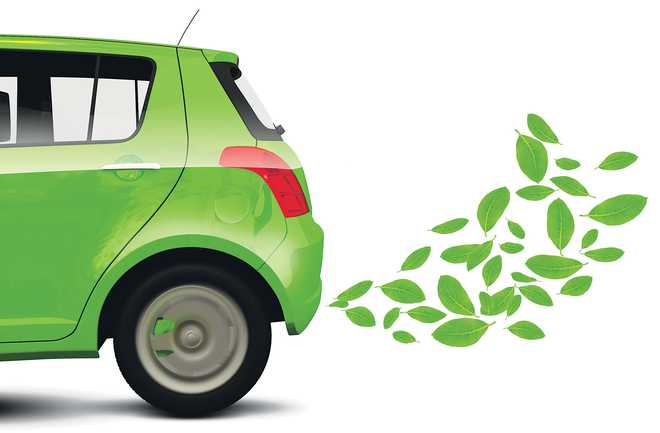
Biodiesel from used cooking oil is a healthy and environment-friendly option, else it is sold to the roadside vendors for frying snacks, which poses threat to health of gullible citizens, says Vijay C Roy
INDIA saved Rs 4,000 crore worth of foreign exchange last year due to ethanol blending in petrol. It plans to take this figure to about Rs 12,000 crore in the next four years. The number appears small compared to the country's total crude oil import bill of $87.73 billion (Rs 5.65 lakh crore) in 2017-2018. But, it is an encouraging beginning.
It is heartening that ethanol blending in petrol has grown by over 270 per cent in just four years — from 38 crore litres in 2013-14 to about 141 crore litres in 2017-18. The government aims to produce nearly 450 crore litres of ethanol in the next four years as its target is to increase ethanol blending to 10 per cent by 2022. It wants to achieve a 20 per cent ethanol blending and 5 per cent biodiesel blending by 2030.
India is the third largest fossil fuel importer after the US and China. It needs to cut its dependence on imported energy. Biofuel is a viable alternative that would not only ensure additional income for Indian farmers but also accelerate industrial growth. Above all, it will help to proportionately reduce the anxiety over the volatility of international fuel prices.
Fossil fuel is finite. The global uproar about the rapidly-declining reserves of fossil fuels has prompted power producers to explore commercially viable and environmentally-friendly alternatives. One of the most viable options is biofuel. The use of biofuels will reduce our energy import dependence. Currently, India imports more than 80 per cent of the crude oil it processes. Shifting the fuel consumption profile to biofuels derived from domestic feedstocks would lead to a decrease in this dependence on crude oil imports.
One of the most promising biofuels is ethanol. It is extracted mainly from sugarcane molasses. It is being used since 2003 with a twin purpose - reducing India's dependence on energy imports and providing a remunerative price to sugarcane farmers. The policy, however, lacks political will due to various lobbies. However, in December 2014, the cabinet approved the usage of non-food feedstocks besides molasses as a source of ethanol that could be blended in fuel.
The government wanted to expand the policy to other agricultural produce. In 2016, Minister of Road Transport and Highways Nitin Gadkari gave the idea of making ethanol from bamboo to boost the economy of the North East. The idea was to create additional income for the inhabitants and set up industries that would have generated employment opportunities. The minister had brought the idea from Italy and he was convinced that the North East could supply 40,000 litres of second-generation ethanol. The second-generation ethanol can also be produced from rice straw, wheat straw and cotton straw.
Ethanol production in India is inadequate. In 2017-18 (October-September), sugarmills were contracted to supply a record 113 crore litres. The previous record was of 111 crore litres in 2015-16. It is estimated that mills would realise over Rs 5,000 crore from the sale of ethanol to oil marketing companies.
The government aims to achieve 10 per cent blending of ethanol with petrol. For that 313 crore litre of ethanol is required, says the Indian Sugar Mills Association. Unless the supply of ethanol is increased from sources other than sugarcane, this target is elusive.
"With the supply of 66.5 crore litres of ethanol in 2016-17, we had 2.1 per cent blending in petrol," Oil Minister Dharmendra Pradhan said at a conference on advanced biofuels. According to the minister, the increased production of ethanol in 2017-18 (139.5 crore litres) would help the government achieve only four per cent blending.
In the case of biodiesel, palm stearin, acid oil, fatty acids and used cooking oils are the sources. The total biodiesel production in the country is likely to touch 12 crore litres this year compared to 0.75 crore litres last year. Compared to India's 8,100 crore litre diesel consumption annually, the current biodiesel production is insignificant.
According to Biodiesel Association of India president Sandeep Chaturvedi, there's a yawning demand-supply gap. "We are heavily dependent on palm stearin for making biodiesel, despite the fact that used cooking oil is a great source of biodiesel. The recent initiative by the Food Safety and Standard Authority of India (FSSAI) to launch RUCO (repurpose used cooking oil) is likely to boost biodiesel," says Chaturvedi.
RUCO is an ecosystem that will enable the collection and conversion of used cooking oil to biodiesel. India is one of the largest consumers of vegetable oil and so has the potential to recover almost 220 crore litres of used cooking oil for the production of biodiesel by 2022.
India generates around 3-4 million tonnes of used cooking oil annually. Therefore, it has immense potential. Currently, used cooking oil is sold to roadside vendors for frying, which poses a threat to citizens' health.
The use of biodiesel is, however, insignificant. In 2017-18, fuel retailers procured 4.36 crore litres of biodiesel against 3.59 crore litres in the previous year. For 2018-19, the target is to procure 8.63 crore litres of biodiesel. It is expected that procurement may go up as the GST rate on biodiesel has been reduced from 18 per cent to 12 per cent in January, this year. The industry, however, is demanding that the tax be brought on a par with ethanol.
Considering the huge potential, oil marketing companies are in the process of setting up a dozen second-generation bio-refineries at an investment of around Rs 10,000 crore across the country. An encouragement to biodiesel will help reduce the consumption of fossils fuels, generate rural employment and protect environment.
In this direction, the Centre recently unveiled a comprehensive biofuel policy, which, among other things, allows farmers to divert surplus crops for biofuel production. The National Biofuels Policy-2018 also seeks to expand the range of feedstock available for ethanol production beyond sugar molasses. Sugarcane juice, sugar-containing crops like beet, sorghum, corn and cassava, and damaged grains unfit for human consumption, such as rotten potato, wheat and broken rice, can be considered for ethanol production. The policy will offer a mechanism to dispose of municipal solid waste by converting it into drop-in fuels.
Biofuel policy
- Ethanol from sugarcane, corn, cassava, damaged food grains, rotten potatoes
- Use surplus food grains for production of ethanol
- Rs 5,000 crore viability gap funding for bio-refineries
Expected benefits
- 1 crore lts of E-10 saves Rs 28 crore of forex
- 150 crore lts ethanol saves forex worth Rs 4,000 crore
- 1 cr lt E-10 saves 20,000 tonne of CO2 emissions
- A solution to 62 MMT of municipal solid waste generated annually
- 1 bio-refinery can generate 1,200 jobs
Please email your feedback at [email protected]



























